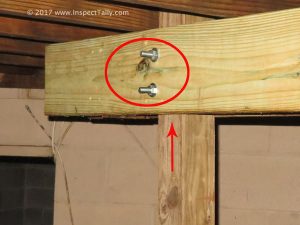As a Tallahassee homeowner, I love decks because they’re the perfect extension from one’s home to the outdoors. They are the ideal place to congregate, eat, cook, and relax, allowing you to have more useable space, and to enjoy being outside. As a Tallahassee Home Inspector, decks frustrate me because they seem fairly simple and inexpensive to build, making them perfect for many DIYers to want to tackle.
Unfortunately DIYers are more often than not lacking the proper tools, knowledge and materials to construct one properly and to today’s safety standards. Despite their best intentions, using the wrong materials, fasteners and cutting corners (figuratively, lol) will have a big impact on the safety and longevity of the deck. Typically problems with a deck’s construction isn’t as apparent in the early days of it’s life, it takes a little while for the wrong fasteners to corrode, or improperly sized joists and ledger beams to begin to sag, for the posts to begin to rot where it enters the ground or improperly secured handrails to weaken.
Deck Inspection – The devil is in the detail
For a couple quick examples of defects we encounter during home inspections on a regular basis, please see below.
Corroded Fasteners:
The chemicals in pressure treated (PT) wood are very corrosive and if the correct fasteners are not utilized the fasteners will corrode away. This leaves the structural framing of a deck not secured. At a minimum, hot dipped galvanized treated fasteners should be used. 
Hand Rails:
All handrails for stairs should be graspable and be composed of decay and corrosion resistant material. A 2×4 or 2×6 laid flat does not meet the requirements of a graspable handrail. (see page 22 from the link supplied at the bottom of the page for the dimensions and profiles of an acceptable handrail.)
Undersized Attachment Hardware:
Undersized joist hangers support the deck joists that are pictured. Those hangers were designed for a 2×6 joist and utilize less fasteners. You should never attach a deck’s ledger board to a cantilevered floor overhang or bay window. Lastly, the ledger board is missing ledger board flashing. 
Missing Fasteners:
Without comment to the size of the hangers in this picture, the joists are not actually attached to the hangers with any fasteners, they are strictly ‘resting’ on the seat of the hanger. All fastener holes should be utilized at all times. 
Incorrect Fasteners Used:
These fasteners are galvanized zinc plated carriage bolts, galvanized zinc plated fasteners should never be used with PT lumber as they will corrode quickly, see #1. Beams should also not be strictly supported by the sheer strength of fasteners. 
Missing Structural Attachments:
Main support beam for this deck was not attached using the correct hardware, and was starting to rotate, it’s only a matter of time before failure occurs.
For a really good reference on how to properly construct a deck, I would suggest reading this: AMERICAN WOOD COUNCIL.


